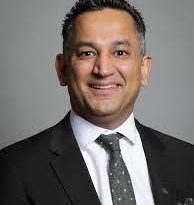Nigel Adams – 2021 Statement on Myanmar
The statement made by Nigel Adams, the Minister for Asia, in the House of Commons on 2 February 2021.
I would like to update the House on the situation in Myanmar. On Sunday evening, Myanmar’s armed forces, the Tatmadaw, seized control of the country, declaring a state of emergency in the early hours of Monday morning. The country is now under the effective control of the commander-in-chief and the military vice-president, Myint Swe. At around 0200 hours local time on 1 February, the Tatmadaw began detaining politicians and civil society leaders across the country, including the democratically elected Aung Sang Suu Kyi and President U Win Myint. The Tatmadaw has said that this state of emergency will continue for a year.
The army has also taken control of the airports. Only military broadcasters are still on air, and phone lines and the internet remain at risk of being disconnected again. The military’s actions follow on from its accusations of fraud during November’s election. Aung San Suu Kyi and the National League for Democracy won by a landslide and the military-backed Union Solidarity and Development party’s share was drastically reduced. While there were significant concerns about the disenfranchisement of minority groups such as the Rohingya, there are no suggestions of widespread irregularities. International observers, such as the Carter Centre and the Asian Network for Free Elections, found no evidence of significant irregularities in the elections. As such, the United Kingdom considers the election result to credibly reflect the will of the people and that Aung San Suu Kyi’s National League for Democracy party is the rightful winner of the election.
The commander-in-chief has indicated an intention to hold new elections to replace the results of those in November 2020. Any dispute regarding the election results should be resolved through peaceful and lawful mechanisms. The Myanmar Supreme Court is hearing a case on alleged irregularities but has not yet decided whether it has jurisdiction. The reports today of the arrest of the chair of the Union Election Commission are deeply concerning.
The events of Sunday night have filled us all with a profound sense of revulsion and sadness. Our thoughts are with the people of Myanmar, who have once again been robbed of their inherent democratic rights. The elections in 2020, though by no means perfect, were an important step on Myanmar’s path to democracy. We and others welcomed them as a strong endorsement of Myanmar’s desire for a democratic future. Myanmar’s transition has been troubled, with a constitution rigged in favour of the military, a campaign of atrocities and systematic discrimination against the Rohingya and other minorities, and a faltering peace process.
This coup threatens to set Myanmar’s progress back by years—potentially decades. As such, we are clear in our condemnation of this coup, the state of emergency imposed in Myanmar and the unlawful detention of democratically elected politicians and civil society by the military. The Prime Minister and the Foreign Secretary both issued statements to this effect on Monday morning. It is essential that Aung San Suu Kyi and all those unlawfully detained are released. We must receive assurances that their safety, wellbeing and rights are being respected. The state of emergency must be repealed, arbitrary detentions reversed, the outcome of the democratic elections respected and the National Assembly peacefully reconvened. We are aware that there is a risk that demonstrations could provoke a violent response, taking Myanmar back to the dark days of the 1988 uprising or the 2007 saffron revolution, in which scores of civilians were killed.
As for the UK response, we are pursuing all levers to ensure a peaceful return to democracy. First, we have made representations at the highest level within Myanmar to encourage all sides to resolve disputes in a peaceful and legal manner. The Foreign Secretary had a call scheduled for later this week with Aung San Suu Kyi prior to her detention. We are clear in our demands that this call goes ahead and we hope that it will serve as an opportunity to confirm her safety. I formally summoned Myanmar’s ambassador to the UK to the Foreign Office yesterday. In the meeting, I condemned the military coup and the arbitrary detention of civilians, including Aung San Suu Kyi, and made it clear that the democratic wishes of the people of Myanmar must be respected, and the elected National Assembly peacefully reconvened. We are doing all we can, working with those in Myanmar, to support a peaceful resolution to this crisis.
Secondly, the international community has a role to play. We are engaging with partners globally and in the region to help to align objectives and find a resolution to the crisis. We will work through multilateral fora to ensure a strong and co-ordinated international response. As president, the Foreign Secretary is co-ordinating G7 partners on its response, aiming to build on its quick statement last week on Navalny. The UK has urgently convened the UN Security Council, which will meet later today. As a champion of the rules-based international order and democratic government, we are driving the international response, including in our role as president of both the G7 and the UN Security Council, urging the military to immediately hand back power to the Government that were legitimately elected in November 2020. The Association of Southeast Asian Nations also has an important role to play, as do the principles of the ASEAN charter, including the rule of law, good governance, and the principles of democracy and constitutional government. We continue to engage with ASEAN partners to support a regional response, and I held a meeting with the Thai vice-Foreign Minister this morning.
Thirdly, it is the military’s actions that instigated this coup. The UK already has a number of measures in place in response to the military’s past and ongoing atrocities. On 19 September 2017, the UK announced the suspension of all defence engagement and training with the Myanmar military by the Ministry of Defence until there is a satisfactory resolution to the situation in Rakhine. The MOD no longer has a defence section in Yangon. The United Kingdom has already imposed sanctions on 16 individuals responsible for human rights violations in Myanmar. We sanctioned all six individuals named by the UN fact-finding mission report, including the commander-in-chief and his deputy, who are the architects of the current political situation and who also have the power to de-escalate the crisis and restore democracy. We will assess how best to engage with the military, if at all. We have also enhanced private sector due diligence to prevent UK funds from going to military-owned companies.
The UK does not provide direct financial aid to the Myanmar Government, but we provide some targeted support, working through other international organisations and multilateral bodies. In the light of the coup, the Foreign Secretary has today announced a review of all such indirect support involving the Myanmar Government, with a view to suspending it unless there are exceptional humanitarian reasons. It is important that our response holds the military accountable.
We will continue to support the people of Myanmar. We will continue leading the international response to this crisis and calling on the military leaders in Myanmar to relent, revoke the state of emergency, release members of the civilian Government and civil society, including State Counsellor Aung San Suu Kyi and President Win Myint, reconvene the elected National Assembly, respect the results of the November 2020 general election, and accept the expressed wishes of the people of Myanmar. I commend the statement to the House.


